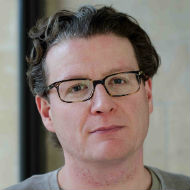Peter J McHugh
Supernumerary Fellow in Biochemistry; Professor of Molecular Oncology; Deputy Director, Molecular Oncology, Weatherall Institute of Molecular Medicine

Contact information
Teaching
My main teaching commitment is the supervision of graduate students performing research, but I also lecture to undergraduate and graduates within the Medical Sciences and Mathematical, Physical & Life Sciences Divisions. At Univ I give tutorials for first and second year Medical students, and some tutorials to third year Biochemists
Research
The DNA in our chromosomes holds our genetic blueprint or genome. Every time a cell divides, it must copy its DNA with near-perfect accuracy to prevent changes being introduced into our genome. Any damage to DNA can create errors during this replication process, including the mutations that can lead to cancer. Cells have evolved elaborate repair mechanisms to fix this damage and ensure that the genetic information is faithfully reproduced. Our focus is on understanding these repair mechanisms at the molecular level. This has important implications for our efforts to prevent cancer, while also helping identify individuals who might be at increased risk of developing cancer.
Our work on DNA damage and repair mechanism also underpins our work on improving cancer treatments. Many chemotherapy drugs and radiotherapy treatments kill tumour cells by damaging their chromosomal DNA. For many cancer patients, these treatments improve their chances of survival, but for some these approaches fail. There is evidence that an increased capacity to tolerate or repair the DNA damage induced by cancer therapies is an important factor in treatment failure. We aim to understand why treatment sometimes fails, and use this information to develop novel strategies for treating cancer.
Selected Publications
Abdullah UB, McGouran JF, Ptchelkine, D, El-Sagheer AH, Brown T and McHugh PJ RPA activates XPF-ERCC1 to initiate the processing of DNA interstrand crosslinks. EMBO J 2017, 36 (14):2047-2060.
Erdal E, Haider S, Rehwinkel J, Harris,AL and McHugh, PJ. A pro-survival DNA damage-induced cytoplasmic interferon response is mediated by end-resection factors, and is limited by Trex1. Genes Dev. 2017, 31(4):353-369.
Lee SY, Brem J, Pettinati I, Claridge TDW, Gileadi O, Schofield CJ, and McHugh PJ Cephalosporins Inhibit Human Metallo-β-Lactamase Fold DNA Repair Nucleases SNM1A and SNM1B/Apollo. Chem Commun. 2016, 52(40):6727-30
Broderick R, Nieminuszczy J, Baddock HT, Deshpande RA, Gileadi O, Paull TT, McHugh PJ, Niedzwiedz W. EXD2 promotes homologous recombination by facilitating DNA end resection. Nat Cell Biol. 2016, 18(3):271-80
Allerston CK, Lee SY, Newman JA, Schofield CJ, McHugh PJ, Gileadi O. The Structures of the SNM1A and SNM1B/Apollo nuclease domains reveal a potential basis for their distinct DNA processing activities. Nucleic Acids Research. 2015, 43(22):11047-60